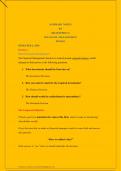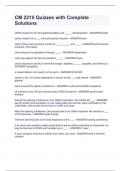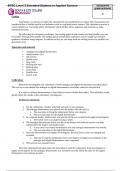lOMoARcPSD|5354807
SUMMARY NOTES
BY
DR.STEPHEN O
FINANCIAL MANAGEMENT
FIN2631
SEMESTER 2, 2020
Heading 1:
What is Financial Management?
The Financial Management function is centred around corporate finance, which
attempts to find answer to the following questions:
1. What investments should the firm take on?
The Investment Decision
2. How can cash be raised for the required investments?
The Finance Decision
3. How should wealth be redistributed to shareholders?
The Dividend Decision
The Corporate Objective
Primary goal is to maximize the value of the firm, which is same as maximizing
shareholder wealth.
Every decision that we make as financial managers needs to come back and answer
this question:
“Have we added value?”
If the answer is “yes” then we should undertake the decision.
Prepared by Stephen ()
, lOMoARcPSD|5354807
Heading 2: Financial Mathematics Part I
The Time Value of Money
A dollar today is worth more than a dollar tomorrow. This is because if I receive a
dollar today, I can invest it for the period up until I would have received the dollar in
the future. The present value technique uses discounting to find the present value of
cash flows, whereas the future value technique uses compounding to find the future
value of each cash flow.
Four Important Cash Flow Patterns
1. Single Sum or Lump Sum Cash Flow
Future Value (Compounding Techniques)
The total amount due at the end of the investment is called the Future Value (FV).
Compounding results in interest that is accrued in previous periods, earns further
interest.
Future Value Formula
FVn = PV x (1 + i)n
Where;
(PV) is the cash flow at date 0,
(i) is the appropriate interest rate, and
(n) is the number of periods over which the cash is invested. E.g.
Investment $1,000, interest rate 6.00%, period of 5 years.
FVn = $1000 x (1.06)5 = $1,338.23
Page 2
()
, lOMoARcPSD|5354807
On Calculator
Note: Always clear the memory of the calculater ([2ndF] > [alpha] > [0] > [0])
Input each value in the calculator as ‘n’, ‘PV’ and ‘I/Y’ then hit ‘comp’ ‘FV’.
FVIF Determination
(1 + i)n is also called the future value interest factor.
• FVIF is the FV of 1 dollar at i% per annum after n periods,
• Future value is due to the number of periods in which interest can be
compounded. The larger the number of periods, the greater the future value,
• Future value also depends critically on the interest rate - the higher the
interest rate, the greater the future value.
Using Financial Tables (Table A-1 Page 776)
Using a table only gives an estimation as the rate is only 3 decimal places, i.e. 6% for
5 years is 1.338.
FV6%,5yrs = $1,000(1.338) = $1.338.00.
Present Value (Discounting Techniques)
The use of discounting techniques aids in finding the current dollar amount of a given
future value.
The general formula for the present value of a multi period case for a single cash
flow can be written as:
FVn
PV= n
Notes prepared by Stephen ()
, lOMoARcPSD|5354807
(1+i)
Where:
(PV ) is the cash flow at date N=0,
(i ) is the appropriate interest rate per period,
(n) is the number of periods over which the cash is invested.
E.g. How much would you have to set aside today in order to have $20,000 five years
from now assuming the current interest rate is 7.00%?
$20,000
PV= 5 =$14,259.72
(1.07)
On Calculator
Clear the memory, then:
20000 [FV]
7 [I/Y]
5 [N]
[COMP] [PV]
PV = -14259.72. This does not mean the answer is a negative, but rather that it is in
a prior period to the future.
PVIF Determination
1/(1 + i)n is also called the present value interest factor.
• PVIF is the PV of 1 dollar at i% per annum after n periods
• Present value is due to the number of periods in which interest can be
discounted. The larger the number of periods, the smaller the present
value.
• Present value also depends critically on the assumed interest rate
(discount rate) - the higher the interest rate, the smaller the present value.
Page 4
()
SUMMARY NOTES
BY
DR.STEPHEN O
FINANCIAL MANAGEMENT
FIN2631
SEMESTER 2, 2020
Heading 1:
What is Financial Management?
The Financial Management function is centred around corporate finance, which
attempts to find answer to the following questions:
1. What investments should the firm take on?
The Investment Decision
2. How can cash be raised for the required investments?
The Finance Decision
3. How should wealth be redistributed to shareholders?
The Dividend Decision
The Corporate Objective
Primary goal is to maximize the value of the firm, which is same as maximizing
shareholder wealth.
Every decision that we make as financial managers needs to come back and answer
this question:
“Have we added value?”
If the answer is “yes” then we should undertake the decision.
Prepared by Stephen ()
, lOMoARcPSD|5354807
Heading 2: Financial Mathematics Part I
The Time Value of Money
A dollar today is worth more than a dollar tomorrow. This is because if I receive a
dollar today, I can invest it for the period up until I would have received the dollar in
the future. The present value technique uses discounting to find the present value of
cash flows, whereas the future value technique uses compounding to find the future
value of each cash flow.
Four Important Cash Flow Patterns
1. Single Sum or Lump Sum Cash Flow
Future Value (Compounding Techniques)
The total amount due at the end of the investment is called the Future Value (FV).
Compounding results in interest that is accrued in previous periods, earns further
interest.
Future Value Formula
FVn = PV x (1 + i)n
Where;
(PV) is the cash flow at date 0,
(i) is the appropriate interest rate, and
(n) is the number of periods over which the cash is invested. E.g.
Investment $1,000, interest rate 6.00%, period of 5 years.
FVn = $1000 x (1.06)5 = $1,338.23
Page 2
()
, lOMoARcPSD|5354807
On Calculator
Note: Always clear the memory of the calculater ([2ndF] > [alpha] > [0] > [0])
Input each value in the calculator as ‘n’, ‘PV’ and ‘I/Y’ then hit ‘comp’ ‘FV’.
FVIF Determination
(1 + i)n is also called the future value interest factor.
• FVIF is the FV of 1 dollar at i% per annum after n periods,
• Future value is due to the number of periods in which interest can be
compounded. The larger the number of periods, the greater the future value,
• Future value also depends critically on the interest rate - the higher the
interest rate, the greater the future value.
Using Financial Tables (Table A-1 Page 776)
Using a table only gives an estimation as the rate is only 3 decimal places, i.e. 6% for
5 years is 1.338.
FV6%,5yrs = $1,000(1.338) = $1.338.00.
Present Value (Discounting Techniques)
The use of discounting techniques aids in finding the current dollar amount of a given
future value.
The general formula for the present value of a multi period case for a single cash
flow can be written as:
FVn
PV= n
Notes prepared by Stephen ()
, lOMoARcPSD|5354807
(1+i)
Where:
(PV ) is the cash flow at date N=0,
(i ) is the appropriate interest rate per period,
(n) is the number of periods over which the cash is invested.
E.g. How much would you have to set aside today in order to have $20,000 five years
from now assuming the current interest rate is 7.00%?
$20,000
PV= 5 =$14,259.72
(1.07)
On Calculator
Clear the memory, then:
20000 [FV]
7 [I/Y]
5 [N]
[COMP] [PV]
PV = -14259.72. This does not mean the answer is a negative, but rather that it is in
a prior period to the future.
PVIF Determination
1/(1 + i)n is also called the present value interest factor.
• PVIF is the PV of 1 dollar at i% per annum after n periods
• Present value is due to the number of periods in which interest can be
discounted. The larger the number of periods, the smaller the present
value.
• Present value also depends critically on the assumed interest rate
(discount rate) - the higher the interest rate, the smaller the present value.
Page 4
()












